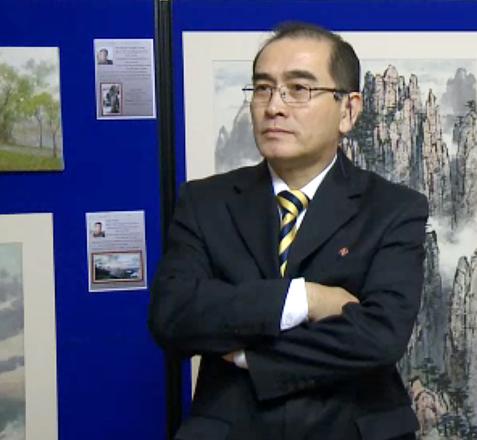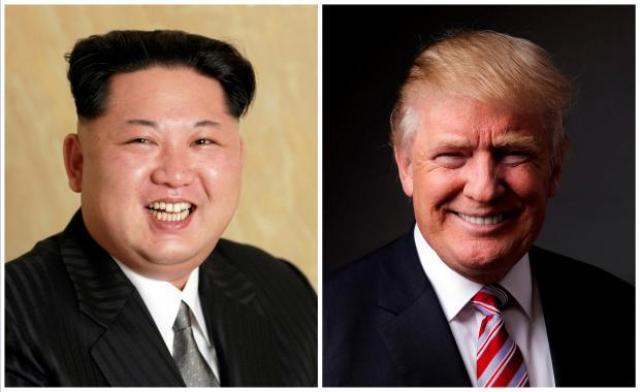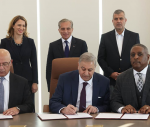You are here
Top London-based North Korea diplomat defects to South
By AFP - Aug 17,2016 - Last updated at Aug 17,2016

In a video grab created on Wednesday taken from footage recorded by AFPTV on November 3, 2014 deputy ambassador at the North Korean embassy in London, Thae Yong-ho, stands in front of an artwork during a photocall to view an exhibition of North Korean art at the North Korean embassy in London (AFP photo)
SEOUL — South Korea said Wednesday that North Korea's deputy ambassador to Britain had defected to Seoul, in a rare and damaging loss of diplomatic face for Pyongyang.
The unification ministry said Thae Yong-ho — the number-two at the North's mission in London — had defected together with his family and they were now in the South Korean capital.
"They are under government protection and are going through necessary procedures with related institutions," ministry spokesman Jeong Joon-hee told reporters.
Jeong declined to reveal Thae's defection route, citing the diplomatic sensitivities involved for the concerned countries.
"On his reasons for defection, Minister Thae cited disgust with [North Korean leader] Kim Jong-un's regime, admiration for South Korea's free, democratic system and the future of his family," Jeong said.
Increasingly isolated internationally because of its nuclear weapons programme, North Korea maintains relatively few overseas embassies, and defections by diplomats of Thae's stature are extremely rare.
The last such case was that of the North Korean ambassador to Egypt who defected to the United States in 1997.
Elite discontent?
Jeong said Thae's defection reflected the loss of faith among North Korea's elite in Kim Jong-un's leadership.
"Awareness that the North Korean regime has reached its limit is spreading and the solidarity of its ruling class is weakening," Jeong said.
It was a pointed comment that was clearly calculated to resonate — even if Thae's defection falls far short of signalling any imminent collapse of the regime in Pyongyang.
Since Kim succeeded his late father Kim Jong-il as supreme leader in 2011, he has carried out a series of high-level purges aimed at consolidating power and surrounding himself with loyalists.
But analysts say continued support is contingent on keeping the Pyongyang elite in the privileged lifestyle to which they are accustomed — a task made far tougher by tightened UN sanctions.
North Korean defectors have been making headlines recently, largely due to an unusual group defection in April by a dozen waitresses and their manager who were working at a North Korean-run restaurant in China.
A North Korean army colonel who had handled spying operations on South Korea was announced to have defected last year.
And, in July, an 18-year-old student, who was in Hong Kong for an international maths contest, reportedly sought asylum in the South Korean consulate in the city.
Thae was believed to have worked at the embassy in London for 10 years, with one of his main tasks being to counter the image of North Korea as a nuclear pariah state and notorious human rights abuser.
PR coup
Apart from the obvious and extremely damaging PR victory his defection hands to South Korea, Thae is likely to prove a crucial source of up-to-date intelligence on the state of the North Korean leadership and its policy priorities.
All North Korean defectors who make it to Seoul undergo an intense, months-long de-briefing at the hands of South Korean intelligence — largely in an effort to root out any potential spies.
In Thae's case, the interrogation will be a lengthy one and he and his family will likely remain in sort of protective custody for some time to guarantee their safety.
Over the years, nearly 30,000 North Koreans have fled poverty and repression in their country and settled in the South.
But the number of defectors — who once numbered more than 2,000 a year — has nearly halved since Kim Jong-un took power after the death of his father and former leader Kim Jong-il in December 2011.
Those who still managed to flee in recent years often had families already settled in the South, or were relatively well-off and well-connected members of the elite in search of better lives.
The highest-ranking defector to come to the South was Hwang Jang-yop, the North's chief ideologue and former tutor to Kim Jong-il. He made a high-profile defection via the South Korean embassy in Beijing in 1997 and died in Seoul in 2010.
Related Articles
SEOUL — North Korea's army chief of staff has been executed, South Korean media reported Wednesday, in what would amount to the latest in a
Almost all North Koreans cast their ballots Sunday in a pre-determined election for a rubber-stamp parliament — an exercise that doubles as a national head count and may offer clues to power shifts in Pyongyang.
SEOUL - North Korean leader Kim Jong Un's sudden overtures to Washington are making headlines around the world.














